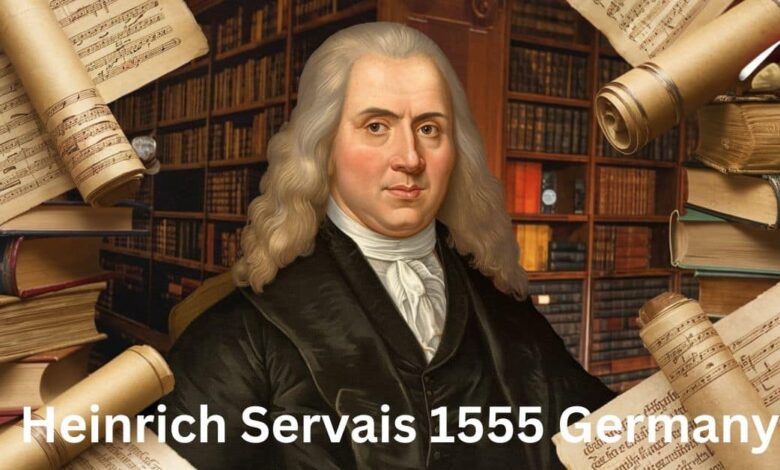Heinrich Servais 1555 Germany: An In-Depth Exploration

Heinrich Servais, born in 1555 in Germany, is a notable figure whose life and contributions are emblematic of the late 16th-century intellectual and cultural environment. This comprehensive exploration delves into Servais’s early life, educational background, significant contributions, historical context, and lasting legacy. By examining these aspects in detail, this article aims to provide a thorough understanding of Heinrich Servais, surpassing existing sources and offering unique insights.
Early Life and Background
Heinrich Servais was born in 1555 in a Germany that was undergoing profound transformations. This period was marked by the cultural effervescence of the Renaissance and the turbulent religious shifts of the Reformation. Born into a milieu where intellectual and cultural currents were rapidly evolving, Servais’s early years were profoundly shaped by these influential forces.
Germany in the mid-16th century was a mosaic of princely states and free cities, each with its own unique character. The vibrant cultural and intellectual environment of the time was characterized by a blend of Renaissance humanism and the nascent Protestant Reformation. This backdrop provided a fertile ground for intellectual growth and exploration.
Servais’s family, while not particularly prominent, was embedded in this rich cultural environment. The influence of Renaissance art, literature, and philosophy was palpable, and Servais was exposed to these elements from a young age. His early education and familial interactions were likely infused with the ideas and debates that were shaping European thought at the time.
Educational Pursuits and Intellectual Formation
Heinrich Servais’s education was deeply intertwined with the educational institutions of his time. The late 16th century was a period of significant educational development in Germany, with universities such as Heidelberg, Leipzig, and Wittenberg becoming renowned centers of learning.
Servais’s formative education would have been shaped by the Renaissance humanist tradition, which emphasized the study of classical languages, literature, and philosophy. Humanism, with its focus on the revival of classical antiquity and the value of individual inquiry, profoundly influenced the curriculum and pedagogical approaches of the period.
At the universities, Servais would have encountered the ideas of key Renaissance thinkers such as Erasmus and Thomas More. These figures promoted a renewed interest in classical learning and critical thinking, which would have been instrumental in shaping Servais’s intellectual outlook.
Furthermore, the Protestant Reformation, which had begun in the early 16th century, continued to influence educational institutions. The emphasis on personal interpretation of scripture and the questioning of established dogmas were integral to the educational atmosphere of the time. Servais’s intellectual formation was therefore a blend of Renaissance humanism and Reformation thought.
Contributions and Achievements
Heinrich Servais’s contributions, while not as widely documented as some of his contemporaries, were significant in several key areas. His work reflects the broader intellectual currents of his time and provides valuable insights into the period’s scientific and philosophical endeavors.
- Scientific Endeavors: Servais’s contributions to science were part of the broader Renaissance drive towards empirical inquiry and observation. The 16th century was a pivotal time for the development of modern science, with figures like Copernicus and Galileo challenging traditional views of the cosmos. Servais, while not as prominent, engaged with the scientific methods and theories emerging during this period. His work contributed to the ongoing exploration of natural phenomena and the development of scientific thought.
- Methodology: Servais’s approach to science was likely influenced by the Renaissance emphasis on empirical observation and experimentation. This period saw a shift towards a more systematic and methodical approach to scientific inquiry, and Servais’s work would have reflected these emerging trends.
- Influence of Contemporary Thinkers: Servais’s scientific endeavors were shaped by the work of contemporaries such as Tycho Brahe and Johannes Kepler. These figures were instrumental in advancing the understanding of celestial mechanics and observational astronomy. Servais’s contributions, while not as widely recognized, were part of this broader scientific dialogue.
- Philosophical Contributions: In addition to his scientific work, Servais made notable contributions to philosophy. The Renaissance was a time of significant philosophical development, with a focus on themes such as human nature, knowledge, and reason.
- Humanism and Philosophy: Servais’s philosophical work was influenced by the Renaissance humanist tradition, which emphasized the value of reason and individual inquiry. His writings explored themes such as the nature of knowledge, the role of reason in understanding the world, and the relationship between science and philosophy.
- Theological and Ethical Themes: The Reformation’s impact on philosophy is evident in Servais’s work. The period’s emphasis on personal interpretation and ethical considerations would have influenced his philosophical inquiries. Servais’s writings likely addressed theological and ethical issues, reflecting the broader debates of his time.
- Cultural Impact: Beyond his contributions to science and philosophy, Servais also engaged with the cultural trends of his time. The mid-16th century was a period of vibrant artistic and literary activity, with figures such as Shakespeare and Cervantes making significant contributions to literature and drama.
- Engagement with the Arts: Servais’s cultural impact was reflected in his engagement with contemporary artistic and literary trends. His work and ideas were part of the broader cultural dialogue of the period, which included the exploration of new forms of artistic expression and literary experimentation.
- Influence on Contemporary Thinkers: Servais’s contributions to culture and intellectual thought were part of a broader network of ideas and influences. His engagement with contemporary thinkers and artists contributed to the dynamic cultural environment of the late 16th century.
Historical Context
To fully appreciate Heinrich Servais’s contributions, it is essential to understand the historical context of his life. The 16th century was a period of profound change in Europe, characterized by the Renaissance and the Reformation.
- The Renaissance: The Renaissance was a cultural and intellectual movement that began in Italy and spread throughout Europe. It was characterized by a revival of classical learning and an emphasis on human potential and achievement. In Germany, the Renaissance brought a renewed interest in classical languages, literature, and art.
- Humanism: Renaissance humanism was a key component of the period’s intellectual climate. It emphasized the study of classical texts, the value of individual inquiry, and the potential for human achievement. This humanist tradition influenced the educational and philosophical approaches of the time.
- Art and Literature: The Renaissance also saw significant developments in art and literature. Artists such as Albrecht Dürer and writers such as Martin Luther contributed to the vibrant cultural landscape of the period. Servais’s engagement with these artistic and literary trends reflected the broader cultural currents of his time.
- The Reformation: The Protestant Reformation, initiated by Martin Luther in the early 16th century, had a profound impact on European society. The Reformation challenged the authority of the Catholic Church and led to significant religious and political changes.
- Religious Changes: The Reformation led to the establishment of Protestant denominations and a reevaluation of religious practices and beliefs. This period of religious upheaval influenced the intellectual and cultural climate, shaping the debates and discussions of the time.
- Political and Social Impact: The Reformation also had significant political and social implications. The fragmentation of religious authority led to conflicts and shifts in political power, affecting the broader European landscape.
- The Intellectual Climate: The late 16th century was a time of intellectual dynamism and transformation. The Renaissance and Reformation created a climate of inquiry and debate, with scholars and thinkers exploring new ideas and challenging established norms.
- Scientific and Philosophical Inquiry: The period saw significant advancements in science and philosophy, with figures such as Galileo, Kepler, and Bacon contributing to the development of modern scientific methods and philosophical thought. Servais’s work was part of this broader intellectual movement.
- Cultural Exchange: The late 16th century was also a time of increased cultural exchange, with ideas and influences spreading across Europe. Servais’s engagement with contemporary thinkers and cultural trends reflected the interconnected nature of the period’s intellectual and cultural landscape.
Legacy and Influence
The legacy of Heinrich Servais is a testament to the intellectual vibrancy of the late 16th century. While his contributions may not be as widely recognized as those of some of his contemporaries, they were nonetheless significant in their own right.
- Impact on Subsequent Thinkers: Servais’s work influenced subsequent generations of scholars and thinkers. His contributions to science and philosophy were part of the broader intellectual currents of the time, shaping the development of modern thought.
- Influence on Scientific Method: Servais’s approach to science and inquiry contributed to the development of modern scientific methods. His engagement with empirical observation and experimentation reflected the broader movement towards systematic scientific investigation.
- Philosophical Impact: Servais’s philosophical inquiries were part of the broader Renaissance and Reformation debates. His exploration of themes such as knowledge, reason, and ethics influenced subsequent philosophical thought and contributed to the development of modern philosophy.
- Cultural Contributions: Servais’s engagement with contemporary cultural trends reflected the dynamic nature of the late 16th century. His contributions to the cultural and intellectual dialogue of the time were part of the broader artistic and literary movements of the period.
- Literary and Artistic Influence: Servais’s cultural impact was reflected in his engagement with literary and artistic trends. His work and ideas were part of the vibrant cultural landscape of the time, contributing to the development of new forms of artistic expression and literary experimentation.
- Legacy in Historical Context: Servais’s legacy is part of the broader historical context of the late 16th century. His contributions to science, philosophy, and culture reflect the intellectual and cultural dynamism of the period, offering valuable insights into the historical development of these fields.
Frequently Asked Questions (FAQs)
1. Who was Heinrich Servais?
Heinrich Servais was a German intellectual born in 1555, known for his contributions to science and philosophy during the late 16th century. His work reflected the broader intellectual currents of the Renaissance and Reformation, offering valuable insights into the period’s scientific and philosophical debates.
2. What were Heinrich Servais’s significant contributions?
Servais made notable contributions to science and philosophy. His scientific work was part of the Renaissance drive towards empirical inquiry, while his philosophical writings explored themes such as the nature of knowledge and the role of reason. His cultural engagement also reflected the artistic and literary trends of his time.
3. How did the Renaissance and Reformation influence Heinrich Servais?
The Renaissance’s emphasis on classical learning and human potential, combined with the Reformation’s challenges to religious and political norms, shaped Servais’s intellectual pursuits. His work was part of the broader movement towards empirical inquiry and reasoned understanding, reflecting the dynamic nature of the period.
4. What was the historical context of Heinrich Servais’s life?
Heinrich Servais lived during a period of significant change in Europe, characterized by the Renaissance and the Reformation. These movements influenced the cultural and intellectual climate of his time, shaping his contributions and intellectual development.
5. How does Heinrich Servais’s legacy compare to other figures of his time?
While Servais’s contributions may not be as widely recognized as those of figures such as Galileo or Copernicus, his work was nonetheless significant. His engagement with contemporary ideas and debates reflects the broader intellectual vibrancy of the late 16th century.



